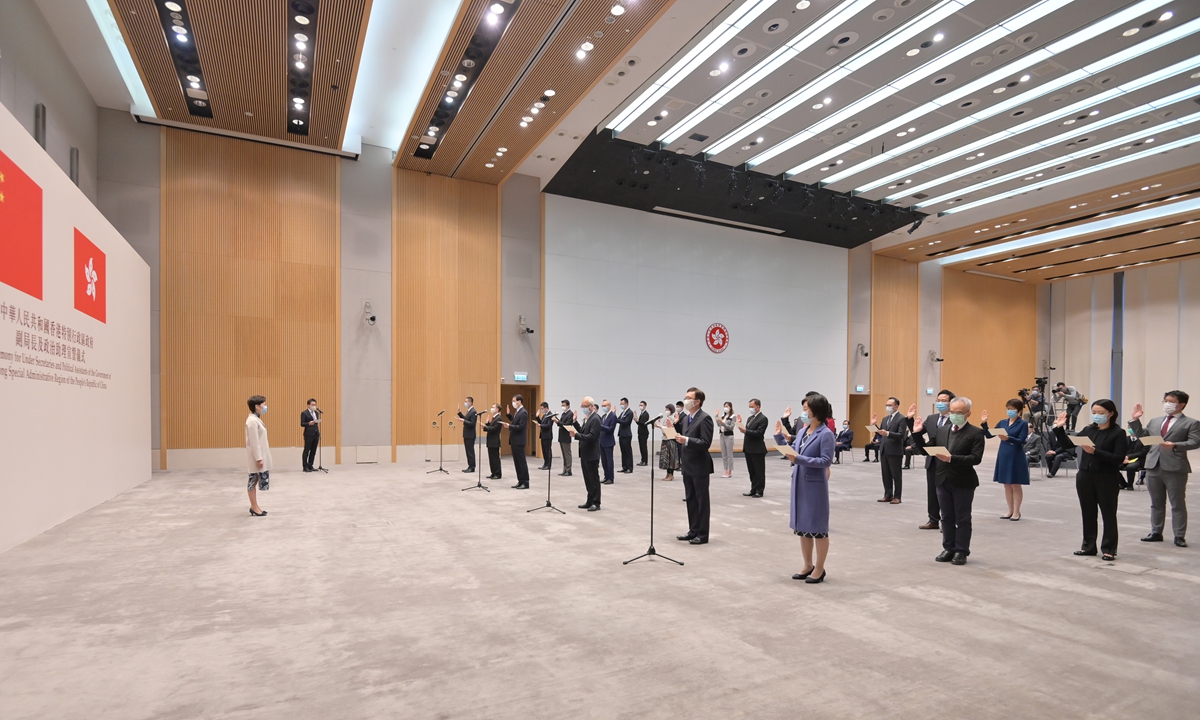Central govt not discussing HK-related issues: NPC delegate
By Wang Qi and Bai Yunyi Source: Global Times Published: 2020/12/23 21:30:46

Hong Kong government holds an oath-taking ceremony for undersecretaries and political assistants on Wednesday. Witnessed by Chief Executive Carrie Lam, the 12 undersecretaries and 14 political assistants vowed to uphold the Basic Law of the Hong Kong Special Administrative Region (HKSAR) and swore allegiance to the HKSAR. Photo: AFP
The nerve of Hong Kong pan-democratic legislators has been touched after local media said that China's top legislative body is mulling to handle "troublemakers" directly, which later proved to be false as experts said the Hong Kong Special Administrative Region (HKSAR) government should and is able to handle it after recent legislation.
Tam Yiu-chung, a member of the Standing Committee of the 13th National People's Congress (NPC), told the Global Times on Wednesday that no Hong Kong-related issues are on the agenda of the ongoing meeting of the NPC Standing Committee.
Tam's remarks came after some Hong Kong media speculated that the central government is mulling erasing 117 Election Committee seats likely to be occupied by opposition district councilors, as well as other moves that are deemed to suppress pro-activist councilors.
Neither the Hong Kong district council issue nor other Hong Kong-related issues are being discussed at the ongoing meeting, Tam told the Global Times on Wednesday.
He earlier told media that there have been no previous cases of an agenda being added halfway through, as the general agenda would normally be issued on the first day of the meeting, and sensitive issues will usually be announced at the end.
Analysts said that the speculation has stirred much concern as Hong Kong faces a problem with its district council members violating the oath and deviating from the constitutional order of "one country, two systems."
Hong Kong media said the central government is mulling to disqualify a large number of Pan-democratic legislators who have failed to fulfill the oath of allegiance to the Basic Law and to the HKSAR.
"The rumor that the NPC Standing Committee directly deals with the qualifications of district councilors and the Election Committee is apparently not a mature plan. It is better for HKSAR to establish a more complete legal norm regarding punishment and management of public officials," Tian Feilong, a legal expert on Hong Kong affairs at Beihang University in Beijing, told the Global Times on Wednesday.
"Making huge adjustments to the existing framework of the Election Committee is a major constitutional issue within the scope of 'one country, two systems,' which needs to be dealt with carefully. Otherwise, it will have a major impact on the existing framework of democracy and constitutional governance in Hong Kong," said Tian, "This is not something the central government pursues."
On November 11, the NPC Standing Committee issued a decision on the qualifications of members of the Hong Kong Legislative Council (LegCo), saying that those who support Hong Kong secessionism, seek foreign interference or commit acts endangering national security, do not support the Basic Law, or are not loyal to the HKSAR will immediately lose their membership in the LegCo.
Although mainly targeted at Hong Kong legislators, the decision also mentioned that the rules apply to all public officials, which means that the SAR should take the initiative to deal with district council members who violate the Basic Law, analysts said.
"The central government wants to keep Hong Kong's politics pluralistic and dynamic, with legitimate and orderly competition, rather than stifling the opposition," Tian said.
After the enactment of the national security law in Hong Kong, there is no urgent need for the central government to make a drastic move, Tang Fei, a Hong Kong-based member of the Chinese Association of Hong Kong and Macao Studies, told the Global Times on Wednesday.
What central government needs to be careful about is whether the Pan-democratic legislators seats would be a "crucial minority," in the 1,200-seat Election Committee, said Tang. "After adding 117 seats from the district council, 300 or 400 seats mean that they can largely decide the result, which would coerce all candidates."
Only 51 representatives of HK's Chinese People's Political Consultative Conference National Committee members were in the electoral body, which Tang believes is not enough compared to the number of district councilors.
Posted in: POLITICS,HK/MACAO/TAIWAN